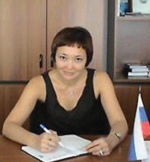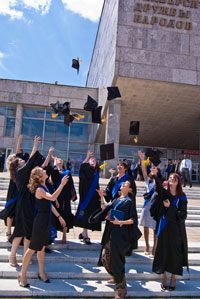( Source http://www.thediplomaticsociety.co.za/index.php?option=com_content&view=article&id=486)
 Dr. Gulnara Krasnova
Dr. Gulnara Krasnova
 Srimal Fernando Asia Correspondent engages Dr. Gulnara Krasnova Vice
Rector on International Activity at the Peoples’ Friendship University
of Russia.
Srimal Fernando Asia Correspondent engages Dr. Gulnara Krasnova Vice
Rector on International Activity at the Peoples’ Friendship University
of Russia.
The discussion was based on the present University system of Russia and learning opportunities provided to Russian and International students at the Peoples’ Friendship University of Russia.
Srimal Fernando (SF): Firstly, could you tell me a little bit about yourself and your background?
Gulnara Krasnova(GK): I was born in Kazakhstan. My first degree was in Russian literature; my PhD was devoted to philosophy and philosophy of education. I have been working at the Peoples’ Friendship University of Russia since 1999.
(SF): From the point of view of the Vice Rector of the Peoples’ Friendship University of Russia, what is your opinion about the current university system of Russia?
(GK): In my opinion both Secondary school and Undergraduate studies are well-organized. The system now is changing rapidly and is more European.
(SF): How do you evaluate the Peoples’ Friendship University of Russia’s performance within the Russian University system?
(GK): In the general rating of Russian universities we occupy the fourth place and the first place in the development of international activity.
(SF): Can you name some of the major undergraduate, post graduate, masters, doctoral courses and research programs that are being offered by the Peoples’ Friendship University of Russia to the Russian and International students?
(GK): Medicine, Engineering and Russian linguistics.

(GK): There are 945 African students and 1245 students from Asia. The majority of African students do medical and technical sciences. As for the Asian students, they mostly study humanities, especially philology and economics.
(GK): The Former president of South Africa, Thabo Mvuyelwa Mbeki, is our honorable Doctor. At present, we have 3 students from South Africa. It is not too many but we would love to have more South African students at PFUR.
(GK): We are working with a company "Racus", which operates in different regions of the world, including Africa and Asia, and has offices in 58 countries. We also started working with other smaller agencies recently.
(GK): The biggest challenge for us is to expand: we are currently working on increasing the number of foreign students to 45% and to expand the number of countries from which our students come from to 150. We also plan to strengthen our position in international and worldwide university rankings. Another challenge we are facing is to teach all of our MA courses in English.
(SF): Is there anything in addition that you would like to include?
(GK): Today Russia gives a lot of opportunities to foreign students. PFUR is the best choice for those who dream to study in the Russian Federation. We are proud of the fact that we have been creating the world’s elite for more than half a century. We are always ready to enroll talented young people from South Africa.

The Peoples’ Friendship University of Russia has students from 150 countries
 Dr. Gulnara Krasnova
Dr. Gulnara Krasnova Srimal Fernando Asia Correspondent engages Dr. Gulnara Krasnova Vice
Rector on International Activity at the Peoples’ Friendship University
of Russia.
Srimal Fernando Asia Correspondent engages Dr. Gulnara Krasnova Vice
Rector on International Activity at the Peoples’ Friendship University
of Russia.The discussion was based on the present University system of Russia and learning opportunities provided to Russian and International students at the Peoples’ Friendship University of Russia.
Srimal Fernando (SF): Firstly, could you tell me a little bit about yourself and your background?
Gulnara Krasnova(GK): I was born in Kazakhstan. My first degree was in Russian literature; my PhD was devoted to philosophy and philosophy of education. I have been working at the Peoples’ Friendship University of Russia since 1999.
(SF): From the point of view of the Vice Rector of the Peoples’ Friendship University of Russia, what is your opinion about the current university system of Russia?
(GK): In my opinion both Secondary school and Undergraduate studies are well-organized. The system now is changing rapidly and is more European.
(SF): How do you evaluate the Peoples’ Friendship University of Russia’s performance within the Russian University system?
(GK): In the general rating of Russian universities we occupy the fourth place and the first place in the development of international activity.
(SF): Can you name some of the major undergraduate, post graduate, masters, doctoral courses and research programs that are being offered by the Peoples’ Friendship University of Russia to the Russian and International students?
(GK): Medicine, Engineering and Russian linguistics.

A multi-cultural group of International students after a concert wearing national costumes of their countries
(SF): Out
of the current International student enrolment, approximately how many
numbers of Asian and African students study various courses at the
Peoples’ Friendship University of Russia.?
(GK): There are 945 African students and 1245 students from Asia. The majority of African students do medical and technical sciences. As for the Asian students, they mostly study humanities, especially philology and economics.
(SF): What
are your thoughts about the Peoples’ Friendship University of Russia’s
cooperation with South Africa and the relationship with the past and
present South African students?
(GK): The Former president of South Africa, Thabo Mvuyelwa Mbeki, is our honorable Doctor. At present, we have 3 students from South Africa. It is not too many but we would love to have more South African students at PFUR.
(SF):
Through what major partner/s or agencies does the Peoples’ Friendship
University of Russia work to promote the Russian education system/the
Peoples’ Friendship University of Russia in South Africa or in certain
South and East Asian countries?
(GK): We are working with a company "Racus", which operates in different regions of the world, including Africa and Asia, and has offices in 58 countries. We also started working with other smaller agencies recently.
(SF): What
are the challenges faced by the University? And what steps has the
University taken to improve the facilities, performance and the image of
the Peoples’ Friendship University of Russia.?
(GK): The biggest challenge for us is to expand: we are currently working on increasing the number of foreign students to 45% and to expand the number of countries from which our students come from to 150. We also plan to strengthen our position in international and worldwide university rankings. Another challenge we are facing is to teach all of our MA courses in English.
(SF): Is there anything in addition that you would like to include?
(GK): Today Russia gives a lot of opportunities to foreign students. PFUR is the best choice for those who dream to study in the Russian Federation. We are proud of the fact that we have been creating the world’s elite for more than half a century. We are always ready to enroll talented young people from South Africa.





